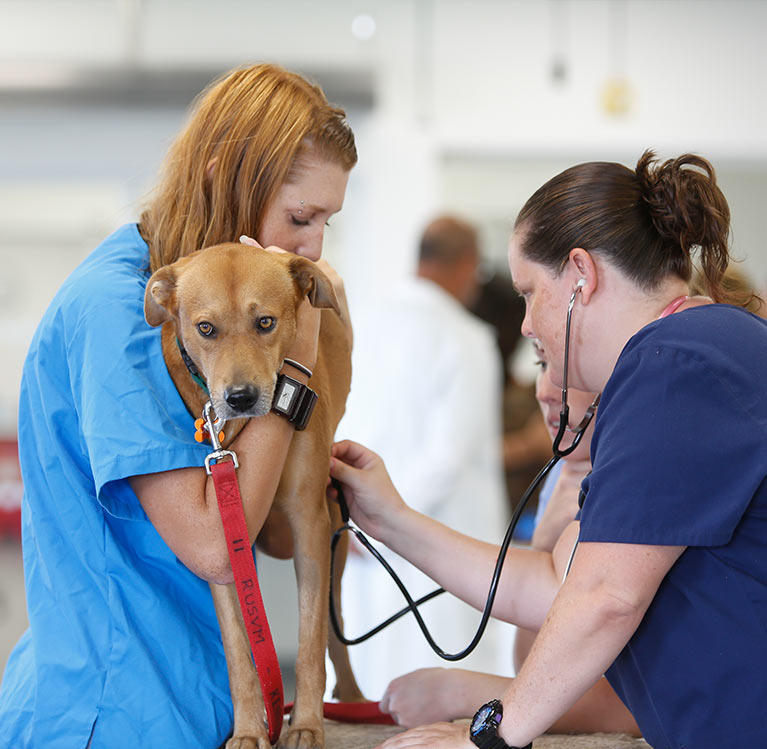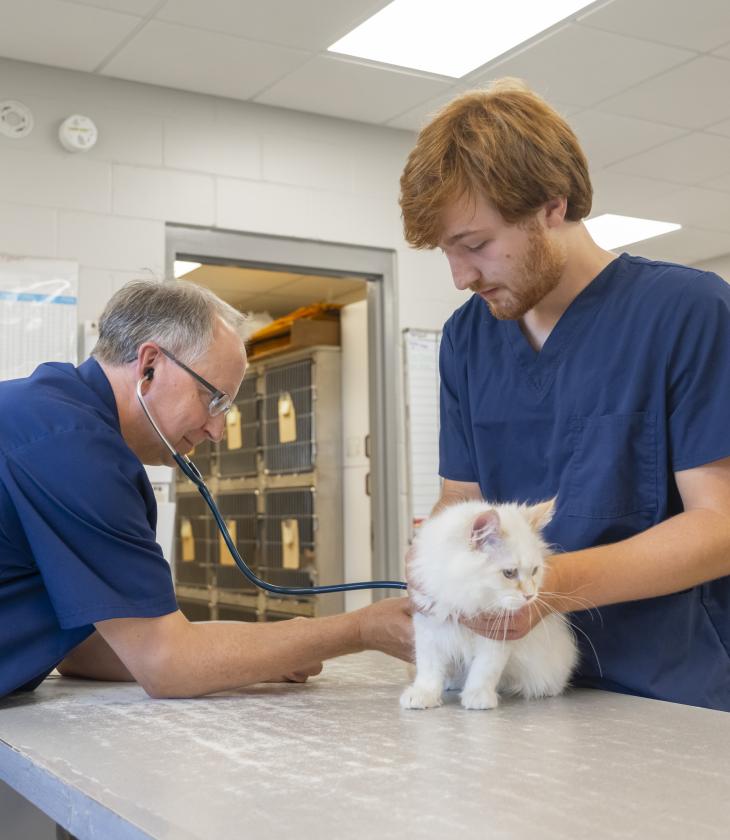Veterinary Oncology Services explained for animal caregivers dealing with tumor diagnoses
Comprehensive Overview to the Solutions Offered by a Vet Oncologist
Veterinary oncology incorporates a broad array of solutions targeted at dealing with and identifying cancer cells in family pets. Board Certified Veterinary Oncologist. Oncologists use innovative diagnostic methods and supply different therapy choices customized to every pet's needs. They likewise prioritize helpful treatment and offer beneficial resources for family pet proprietors. Comprehending these solutions is important for making educated decisions. What particular facets of veterinary oncology can significantly influence an animal's therapy trip?
Understanding Veterinary Oncology
Vet oncology is a specialized area concentrated on dealing with and detecting cancer in animals. This self-control incorporates a large range of strategies, from medical treatments such as chemotherapy and immunotherapy to surgical treatments focused on removing tumors. Veterinary oncologists are educated to identify the one-of-a-kind manifestations of cancer in various types, allowing them to customize therapy strategies to private people.
In enhancement to traditional treatments, veterinary oncology highlights encouraging treatment, which plays an essential role in enhancing the lifestyle for afflicted animals. This includes pain administration, nutritional support, and palliative care options. Collaboration with pet owners is important, as they are important to decision-making regarding their animals' treatment paths. As research advancements, veterinary oncology continues to evolve, offering brand-new hope and boosted results for family pets identified with cancer. Overall, this field is basic for resolving the intricacies of cancer cells in buddy animals.
Advanced Diagnostic Techniques
Advanced analysis strategies play an important role in veterinary oncology, giving essential understandings right into the existence and level of cancer in pets. Imaging modalities such as ultrasound, CT scans, and MRI are frequently used to visualize lumps and evaluate their features. In addition, biopsy procedures are very important for acquiring cells examples, permitting definitive diagnosis and tailored treatment strategies.
Imaging Modalities Utilized
Imaging techniques play a crucial duty in the medical diagnosis and management of cancer in pets. Veterinary oncologists utilize numerous innovative imaging techniques to assess lump existence, dimension, and metastasis. Radiography, or X-rays, uses a preliminary view of bone and breast problems, while ultrasound offers real-time imaging of soft tissues, enabling comprehensive assessment of internal body organs. Calculated tomography (CT) enhances visualization of complicated physiological structures and allows 3D reconstructions, helping in specific tumor localization. Magnetic resonance imaging (MRI) is invaluable for soft tissue differentiation, specifically in brain tumors. Furthermore, nuclear medication strategies such as positron emission tomography (PET) help determine metabolic activity within tumors. Jointly, these methods enhance diagnostic accuracy, assisting reliable therapy techniques for oncological individuals.
Biopsy Treatments Clarified
Following the initial evaluation with imaging methods, getting a definitive diagnosis typically needs cells tasting with biopsy treatments. Vet oncologists use different biopsy strategies based upon the growth's area and features. Great needle desire (FNA) is a minimally intrusive approach that removes cells for cytological exam, perfect for shallow masses. Core needle biopsies supply bigger tissue samples and serve for deeper tumors, permitting histopathological evaluation. Surgical biopsies entail excising a section or the whole growth, assisting in complete examination. These procedures not only confirm the visibility of cancer however likewise help determine its kind and quality, assisting treatment choices. Each biopsy strategy is chosen thoroughly to balance analysis accuracy with client safety and convenience.
Therapy Choices for Cancer Cells in Family pets
When a pet is detected with cancer, a selection of treatment alternatives become offered to assist manage the condition and improve quality of life. Vet oncologists generally advise a multidisciplinary approach customized to the specific animal's demands, which may include surgery, radiation therapy, immunotherapy, or alternative therapies.
Surgery is typically employed to get rid of lumps and damaged cells, possibly bring about full remission sometimes. Radiation treatment intends to target and destroy cancer cells, minimizing tumor dimension and minimizing signs and symptoms - Veterinary Oncology Services. Immunotherapy utilizes the animal's body immune system to combat cancer cells better, while alternate treatments could consist of acupuncture or organic supplements to support overall health
Each treatment choice brings its very own advantages and dangers, and vet oncologists function very closely with pet dog proprietors to develop a thorough plan that aligns with the pet's particular diagnosis and the owner's wishes. The supreme goal is to improve the family pet's convenience and lifestyle throughout their cancer cells trip.
Chemotherapy for Animals
Chemotherapy is a common therapy choice for family pets identified with cancer and is typically utilized together with other treatments laid out by vet oncologists. This treatment involves the administration of details medicines created to ruin and target cancer cells, thereby reducing lump dimension and avoiding the spread of the disease. Vet oncologists customize chemotherapy methods based upon the kind of cancer, the pet dog's general health, and the wanted therapy outcome.
Adverse effects can happen, as these drugs might additionally influence healthy and balanced cells. Typical reactions include queasiness, throwing up, and temporary modifications in appetite - Pet Cancer Surgery. Vet oncologists are furnished to manage these adverse effects effectively, making certain the animal's convenience throughout the treatment procedure. Routine surveillance with blood examinations and follow-up visits is important to examine the pet's action to chemotherapy and make needed adjustments. Eventually, radiation treatment can offer substantial benefits, improving the top quality of life for animals encountering cancer cells diagnoses

Radiation Therapy in Vet Medication
Radiation therapy functions as an efficient treatment alternative for animals diagnosed with local growths, offering a targeted technique to cancer monitoring. This method utilizes high-energy radiation to harm the DNA of cancer cells, inhibiting their capacity to proliferate. It is specifically helpful for tumors that are not open to surgical elimination or for situations where surgery might not be feasible as a result of important site the tumor's area.
Veterinary oncologists customize radiation protocols based on lump area, type, and dimension, along with the animal's total health. Therapy can be supplied through exterior beam radiation or brachytherapy, each with unique benefits. Usually, numerous sessions are required to optimize effectiveness while lessening negative effects.
Although family pets might experience temporary responses such as skin irritation, the overall goal is to reduce tumors and ease symptoms, eventually enhancing the pet's diagnosis and quality of life. As necessary, radiation treatment plays a necessary role in comprehensive cancer care.
Palliative Care and High Quality of Life
Palliative care in veterinary oncology concentrates on enhancing the quality of life for animals facing terminal diseases, guaranteeing comfort and dignity in their last days. This customized strategy focuses on discomfort administration, sign control, and psychological assistance. Vet oncologists evaluate each animal's individual needs, customizing treatments to ease discomfort and improve total health.
Strategies may include administering drugs for discomfort relief, taking care of nausea, and resolving various other upsetting symptoms. In addition, dietary support is often given to preserve strength and boost hunger. company website The emotional facet of palliative care is equally crucial; producing a calm setting assists reduce anxiousness for both family pet and owner.
Inevitably, the goal of palliative care is to enable pets to appreciate their staying time with as much joy and self-respect as possible. By concentrating on comfort and quality of life, vet oncologists play a crucial function in guaranteeing that pet dogs and their family members navigate this tough trip with compassion and understanding.
Support for Family Pet Owners During Therapy

Emotional Guidance for Owners
Charting the psychological landscape during a family pet's cancer cells therapy can be a frustrating experience for proprietors. The unpredictability bordering diagnosis and diagnosis can lead to feelings of sadness, anxiousness, and helplessness. Vet oncologists recognize the value of psychological support and commonly provide support to aid owners navigate this challenging trip. Interaction is important; going over therapy options and prospective results can relieve some fears. Furthermore, using confidence that emotional reactions stand fosters a helpful setting. Several oncology clinics may also suggest support groups or counseling services tailored for family pet proprietors, promoting common experiences. Urging proprietors to focus on self-care throughout this moment is vital, as their emotional health straight affects their pet dog's convenience and total therapy experience.

Resources and Educational Materials
Steering via the intricacies of an animal's cancer therapy can be frightening for owners, making accessibility to reputable sources and instructional materials important. Vet oncologists often offer a range of handouts, brochures, and online materials that discuss therapy choices, prospective adverse effects, and treatment strategies. These sources aid empower and debunk the process pet dog proprietors to make educated decisions. Furthermore, many oncology facilities provide accessibility to support teams and online forums where proprietors can get in touch with others encountering similar obstacles, fostering a feeling of community. Educational webinars and workshops carried out by vet professionals better enhance understanding, making certain that owners are well-appointed to navigate their family pet's journey with cancer cells therapy with self-confidence and expertise.
Often Asked Inquiries
How Can I Prepare My Animal for a Vet Oncology Go To?
Preparing a family pet for a vet oncology go to includes celebration medical records, keeping in mind signs and symptoms, and ensuring the animal is comfy. A tranquil disposition and familiar products can aid ease anxiety during the visit.
What Are the Indicators My Pet Dog May Have Cancer?
Signs that an animal may have cancer cells consist of inexplicable weight reduction, consistent vomiting or looseness of the bowels, uncommon swellings or swellings, sleepiness, modifications in cravings, trouble breathing, and changes in actions. Motivate vet focus is crucial.
How Can I Assistance My Pet Dog Emotionally Throughout Therapy?
Sustaining a pet dog psychologically throughout therapy includes offering comfort, maintaining routines, offering mild love, and making certain a tranquil atmosphere. Taking part in quiet play and regular friendship assists ease stress and anxiety and promotes a feeling of safety.
Exist Alternate Therapies for Pets With Cancer cells?
Different therapies for pets with cancer cells consist of acupuncture, natural treatments, and dietary support. These approaches might match conventional therapies, promoting overall health. Consulting with a veterinarian is important for efficient and safe assimilation of alternate treatments.
What Expenses Should I Anticipate for Vet Oncology Services?
The awaited expenses for vet oncology services can differ significantly, frequently affected by diagnostics, treatments, and recurring care. Pet dog owners need to get ready for expenses varying from consultations to specialized treatments, reflecting the intricacy of cancer cells administration.
Cooperation with animal proprietors is important, as they are indispensable to decision-making regarding their pet dogs' treatment courses. Each therapy option lugs its own benefits browse this site and threats, and veterinary oncologists function closely with pet dog owners to create a comprehensive strategy that straightens with the animal's details diagnosis and the owner's desires. Pet dogs might experience temporary responses such as skin irritability, the overall objective is to reduce lumps and reduce signs, inevitably improving the animal's prognosis and top quality of life. Assistance for pet owners during treatment is crucial in guiding via the emotional challenges connected with a family pet's cancer cells medical diagnosis. Preparing a pet dog for a vet oncology go to involves event medical records, noting signs, and making sure the pet dog is comfy.